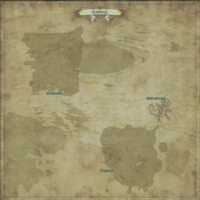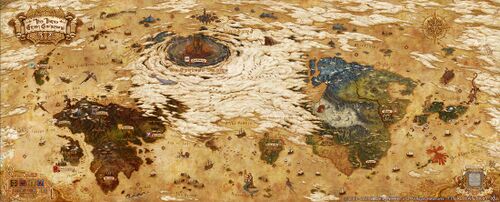Ilsabard
“Ilsabard lies northeast of Eorzea.
— In-game description
Ilsabard is a region in Hydaelyn.
Positioned between Aldenard and Othard, the continent of Ilsabard is characterized by extreme temperatures and unpredictable weather. The northern territories located beyond Ilsabard's dividing central mountain range are oft regarded as some of the harshest environments on Hydaelyn, with several coastal communities made to endure unforgiving storms in the summer and frozen seas in the winter.
Fifty years ago, civilization on Ilsabard took a significant leap when Garlemald began the Magitek Revolution uprising. After quickly toppling several nearby nations, the Garlean empire led their armies across the mountains and into southern Ilsabard (Near East) and proceeded to conquer until the entirety of the continent was annexed and absorbed.[1]
Zones
Garlemald
- Main article: Garlemald
Thavnair
- Main article: Thavnair
Radz-at-Han
- Main article: Radz-at-Han
Lore
Positioned between Aldenard and Othard, the continent of Ilsabard is characterized by extreme temperatures and unpredictable weather. The northern territories located beyond Ilsabard’s dividing central mountain range are oft regarded as some of the harshest environments on Hydaelyn, with several coastal communities made to endure unforgiving storms in the summer and frozen seas in the winter. This has ultimately impeded the advancement of civilization, forcing people to instead exhaust their resources to simply survive.
However, fifty years ago, civilization on Ilsabard took a significant leap when, through science and ingenuity, the small northern nation of Garlemald started an uprising which would eventually change the entire face of the Three Great Continents—the Magitek Revolution. After quickly toppling several nearby nations, the Garleans, now an empire, set their sights on warmer climes and led their armies across the mountains and into southern Ilsabard—an area known to Eorzeans as the Near East—and proceeded to conquer all in their path until nearly the entirety of the continent was annexed and absorbed. [2]
References

